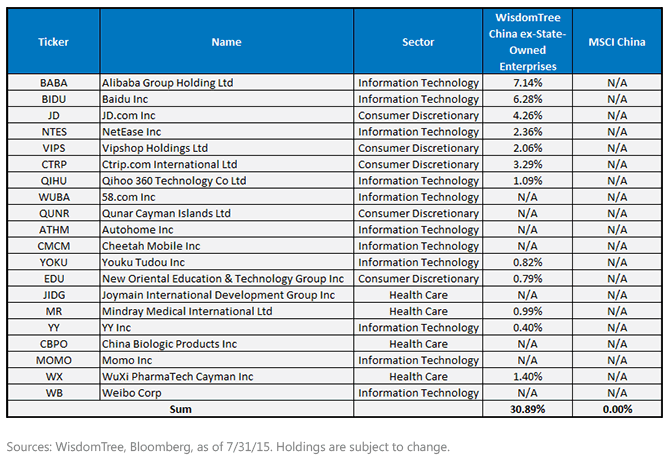Which Chinese Stocks Are Eligible in Your Index?


 • MSCI China Under-weight Information Technology: By not including these U.S.-listed Chinese securities, MXCN is under-weight Information Technology compared to CHXSOE, with 13.8% exposure, compared to 31.7%. The largest company MXCN is excluding is Alibaba, an Internet-based e-commerce business considered the Amazon and eBay of China, but with (currently) higher revenues. Another is Baidu, a Chinese search engine often thought of as the Google of China. Although MXCN will be adding weight to the Information Technology sector, we expect MXCN to remain under-weight compared to CHXSOE and heavily invested in the many state-owned companies that still dominate China’s market.
One could potentially expect volume and buying pressure to pick up in many of these names as we get closer to November.3 As these securities are added to various MSCI indexes, many active managers and other investment vehicles that track these indexes should be inclined to also purchase these securities. It is difficult to determine the exact dollar amount that will flow into these securities, but we believe it will be noticeable.
1Source: MSCI, “Consultation on China A-Shares Index Inclusion Roadmap”, June 2015.
2Sources: WisdomTree, Bloomberg, as of 7/31/15.
3MSCI will potentially include 17 overseas-listed stocks between November 2015 and May 2016, so November could mark the beginning of increased activity in these names.
• MSCI China Under-weight Information Technology: By not including these U.S.-listed Chinese securities, MXCN is under-weight Information Technology compared to CHXSOE, with 13.8% exposure, compared to 31.7%. The largest company MXCN is excluding is Alibaba, an Internet-based e-commerce business considered the Amazon and eBay of China, but with (currently) higher revenues. Another is Baidu, a Chinese search engine often thought of as the Google of China. Although MXCN will be adding weight to the Information Technology sector, we expect MXCN to remain under-weight compared to CHXSOE and heavily invested in the many state-owned companies that still dominate China’s market.
One could potentially expect volume and buying pressure to pick up in many of these names as we get closer to November.3 As these securities are added to various MSCI indexes, many active managers and other investment vehicles that track these indexes should be inclined to also purchase these securities. It is difficult to determine the exact dollar amount that will flow into these securities, but we believe it will be noticeable.
1Source: MSCI, “Consultation on China A-Shares Index Inclusion Roadmap”, June 2015.
2Sources: WisdomTree, Bloomberg, as of 7/31/15.
3MSCI will potentially include 17 overseas-listed stocks between November 2015 and May 2016, so November could mark the beginning of increased activity in these names.
Important Risks Related to this Article
Investments in emerging, offshore or frontier markets are generally less liquid and less efficient than investments in developed markets and are subject to additional risks, such as risks of adverse governmental regulation and intervention or political developments.
Investments focused in China increase the impact of events and developments associated with the region, which can adversely affect performance.
Investments focusing on certain sectors and/or smaller companies increase their vulnerability to any single economic or regulatory development. This may result in greater share price volatility.


